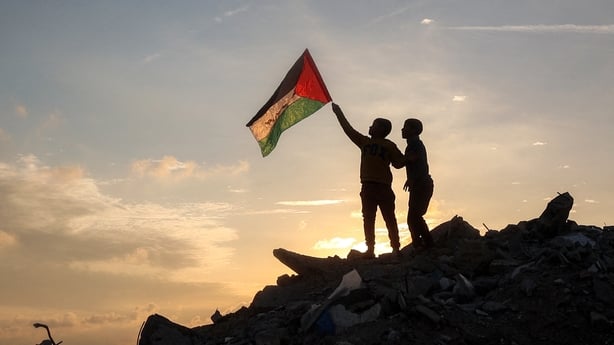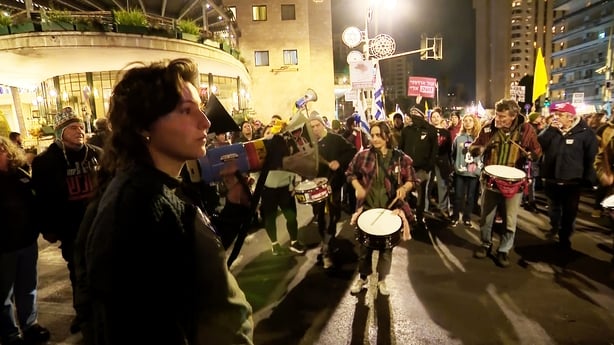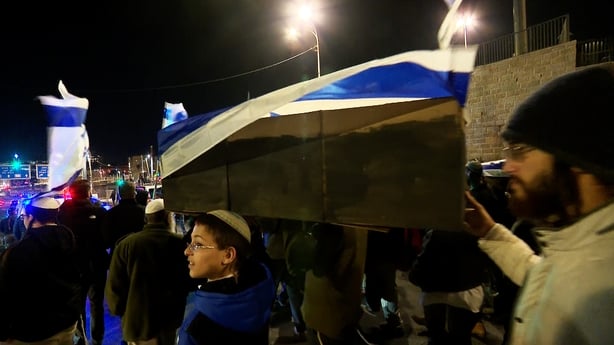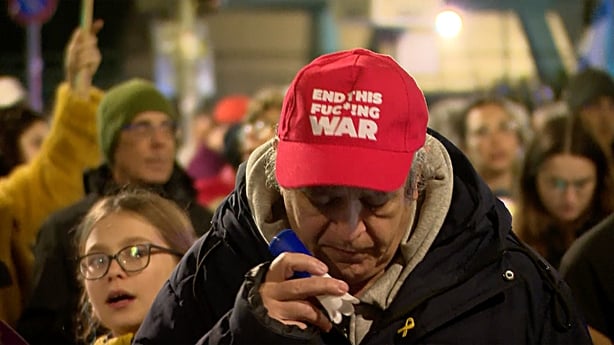And so the ceasefire has begun.
In its wake lies a Gaza transformed into a shattered landscape - where seven in ten buildings lie damaged or destroyed, where entire neighbourhoods have been reduced to fields of concrete and twisted metal and where the UN estimates reconstruction could take centuries under current conditions.
Even more devastating is the human toll.
The Hamas-run health ministry reports that nearly 47,000 Palestinians have been killed and more than 110,000 injured, with a quarter of the wounded bearing life-changing injuries.
These figures have faced scrutiny but they remain the most comprehensive available count, with independent research suggesting the actual toll could be even higher.
The scale of loss has been particularly severe among civilians - with UN analysis indicating that women and children may account for up to 70% of the casualties.
"We hope, by the name of God, that today is the last day of war. We hope that there won't be any violations of the ceasefire," Mahmoud Sheikh Abed, a displaced man from the city of Rafah, said in Khan Younis yesterday.
"The people are tired. We are tired from displacement, from illnesses, from starving, from fatigue."
In Israel, the 7 October attack - when Hamas fighters rampaged through towns and military bases in southern Israel and killed more than 1,100 people - has carved itself deep into the country's collective consciousness.
Instead of healing, that wound has spawned division over the past 15 months.

The families of hostages rage at what they see as a government that has prioritised military objectives over bringing their loved ones home. That feeling is shared by many Israelis.
Others insist the war must continue until Hamas is eliminated, viewing any pause as a dangerous concession.
A smaller but vocal minority has grown increasingly distressed by the devastating toll on Palestinian civilians, even as most Israelis remain convinced that an Israeli response was necessary.
Despite these visible divisions, polls suggest that most Israelis support the ceasefire agreement and its promise to bring hostages home.
But the fractures have nonetheless turned Israel's streets into a canvas of competing protests, where questions of security, morality, and survival collide.
Nowhere was that more true than in Jerusulam last night - where two starkly different demonstrations played out.
Though separated by just a few hundred metres, they were worlds apart in terms of their vision for Israel's future.

At one rally, demonstrators clutched photos of hostages and pleaded for an end to the war.
"My sign says 'enough', and it means everything. It's to stop the war, which we should have stopped a year ago," Shira Shohami, a spiritual care provider in a local hospital, told RTÉ News.
"We're doing terrible crimes there, so that should stop. Our hostages are still there. Although it seems like three of them are coming tomorrow, no, it's not enough."
Just streets away, the voices of protestors thundered through the government district with a single message: you do not sign a deal with the devil.
They carried cardboard coffins draped in Israeli flags, a stark warning of what they fear this ceasefire could bring: another 7 October-style massacre.
The crowd that surged through the streets was a tapestry of Israel's right wing: ultra-Orthodox Jews, religious nationalists, and Israeli settlers from the Occupied West Bank.
"These people, they're evil, they want to kill us. This is so simple. They're not complicated things. They want to kill us. We want to live," said Ariel Deutsch, a 22-year-old man living in Eli, a large illegal Israeli settlement in the West Bank.
While he welcomes the promised return of 33 Israeli hostages over the coming weeks, the price - the release of more than 1,000 Palestinian prisoners - fills him with rage.

Israelis have said that the prisoners being released are terrorists and murderers, while Palestinians view those same people as freedom fighters who rose up against Israel's illegal occupation.
"These people, after they come out of Israeli prisons - they are accepted as heroes, and as saints of a sort. They bring inspiration to their people to continue and perform horrendous actions on Jews," said Roei Ben Dor, citing statistics about prior prisoner releases that have been widely disseminated by Israel's security establishment.
Among those slated for release is Zakaria Zubeidi, a prominent militant commander from the second Palestinian intifada, or uprising, and three men allegedly tied to a Hamas cell whose bombings killed more than 30 Israelis.
"The people that they are letting go, the terrorists of Hamas, are going to live just near my house. I'm going in my car on the road to work, and my wife, she'll be left at home with nobody to protect her," Mr Deutsch said.
The list also includes many Palestinians held under so-called administrative detention - a controversial practice that allows Israel to imprison people indefinitely without trial, based on undisclosed evidence.
However, at the pro-deal rally many insisted that the deal actually does not go far enough.
Among them is Michal Genesove, a 27-year-old history student who harbours deep scepticism about the Israeli government's commitment to the deal.
Even if it is fully implemented, she believes it's only a partial solution.
"It doesn't put a complete end to the war. It doesn't return all the hostages," she said, donning a red cap emblazoned with the words "END THIS FUC*ING WAR".

That the hat's design echoes Donald Trump's signature "Make America Great Again" caps is no coincidence.
Ms Genesove said she wanted a new beginning for Israel.
"We want our country to grow into something better than it was before."
Her words carried a glimmer of hope - an emotion that, ironically, she shared with those at the other rally, even if it was hope of a different kind.
As that opposing rally drew to a close, Mr Deutsch, the resident of the illegal settlement, sought me out again. He had more to say.
"The Israeli people are brave, are strong, and if we fall, we will get over it. And we will fight, and we will stand up," he said.
"This is us. This is the Israeli people."





